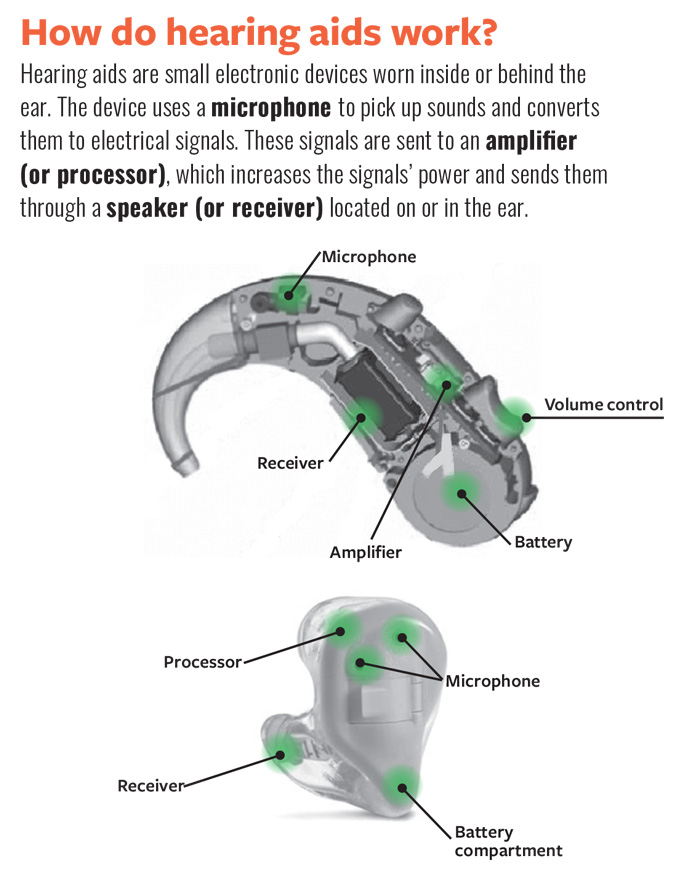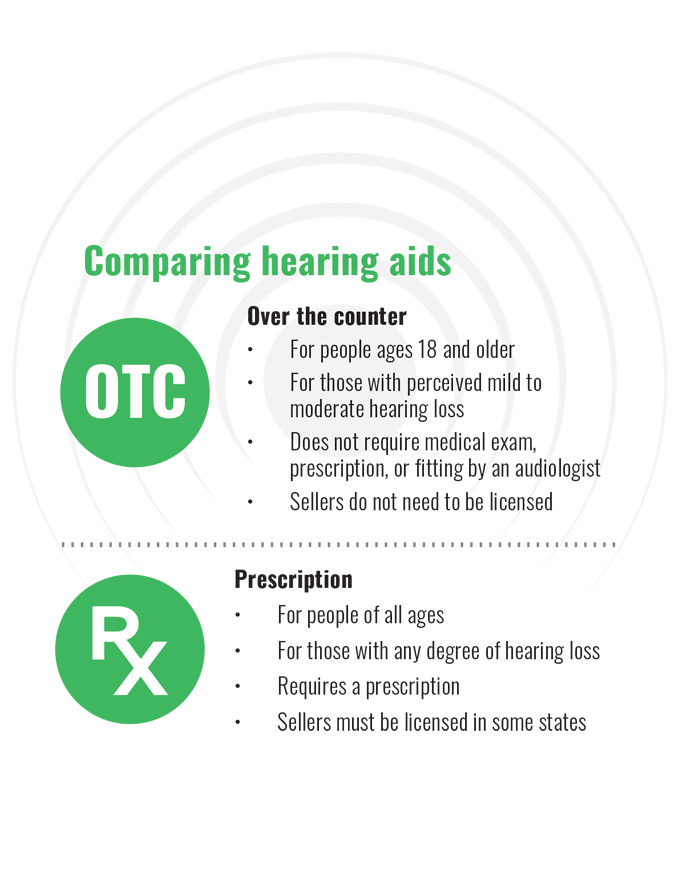
Last updated on July 18th, 2024 at 11:51 am
Hearing loss affects approximately 37.5 million people in the United States ages 18 years or older. It affects one in three people ages 65 to 74 and nearly half of people ages 75 and older. But only about a quarter of those who could benefit from a hearing aid use one.
Barriers to use include high costs, stigma, limited access, and the belief that hearing aids are not worth the benefit. The U.S. Food and Drug Administration (FDA), which regulates the safety and efficacy of hearing aids, provides information about over-the-counter hearing aids for adults 18 or older with perceived mild to moderate hearing loss. The hope is that these devices will become more affordable and accessible.
What are some causes of hearing loss?
- Age
- Exposure to loud noise from machinery or residential tools such as lawnmowers and leaf blowers
- Excessively loud music
- Earwax or fluid buildup
- Punctured eardrum
- Health conditions such as diabetes, high blood pressure, stroke, brain injury, or a tumor
- Some medicines used to treat serious infections, cancer, and heart disease
- Heredity
What are side effects of hearing loss?
“Hearing loss, even if mild or moderate, significantly affects quality of life for tens of millions of adults in the United States,” said Debara L. Tucci, M.D., M.S., M.B.A., Director of the National Institute on Deafness and Other Communication Disorders (NIDCD).
This can make it hard to understand and follow a doctor’s advice, to notice and respond to warnings, or to hear phones, doorbells, and smoke alarms.
Hearing loss has been associated with serious conditions such as depression, low self-esteem, cognitive decline, reduced mobility, and falls. It can also make it hard to engage with others, which can lead to social isolation and avoiding stimulating activities.
Age-related hearing loss can worsen over time. That impacts how well you understand speech, especially in noisy environments such as restaurants. As people get older, some experience tinnitus (a ringing sensation in the ears). Many individuals experience a type of dizziness called presbyastasis, a condition that affects our inner ear and sense of balance as we age.
How can I get a hearing aid?
Hearing aids are available with a prescription or over the counter. A rule change by the FDA in August 2022 made over-the-counter devices available without needing an examination by an audiologist (a hearing health professional). These hearing aids can help adults ages 18 and older with perceived mild to moderate hearing loss. Prescription hearing aids are available from a professional who will help select, program, and maintain the devices. Children and individuals with more severe or complex hearing loss should always work with an audiologist.
If you think you have hearing loss, talk with an audiologist to learn more about over-the-counter and prescription devices. They can help you determine whether hearing aids are right for you. Know the return policy for any hearing aid you purchase, whether it’s over the counter or by prescription, in case you decide the device is not for you.
A hearing aid can help people hear more sound in both quiet and noisy situations. It can process sounds based on their pitch, frequency, or what direction they come from. The user can also change some of these programs to fit their needs.
Why did FDA make this rule?
The new FDA rule for establishing over-the-counter hearing aids comes after decades of research by NIDCD and others, Dr. Tucci said. Since 2009, NIDCD has supported more than 60 research projects to make hearing health care more available and affordable. These projects included research on adults with possible mild to moderate hearing loss. A committee of experts in 2016 wrote that the confusing hearing health care system made it hard for people to get the care they need. The experts also did not find any evidence that requiring a medical evaluation before getting a hearing aid was clinically beneficial for patients.
“NIDCD-supported clinical research has shown that over-the-counter hearing aids for adults with perceived mild to moderate hearing loss can work as well as prescription hearing aids purchased through an audiologist,” she said.

Hearing aids can be worn outside the ear (top) or inside the ear (bottom).
[Text equivalent of above image: How do hearing aids work? Hearing aids are small electronic devices worn inside or behind the ear. The device uses a microphone to pick up sounds and converts them to electrical signals. These signals are sent to an amplifier (or processor), which increases the signals’ power and sends them through a speaker (or receiver) located on or in the ear. Top photo shows a hearing aid that looks like a candy cane, with a microphone close to the curved section that fits in the ear canal, a receiver halfway back, an amplifier just above the receiver, the battery at the top, and volume control near the top. Bottom photo shows a compact hearing aid, with the processor near the top, the microphone just below the processor, the battery compartment toward the bottom, and the receiver near the curved piece that fits in the ear canal.]
Cost of hearing aids
The FDA expects that this new rule will increase market competition for hearing aids and could also reduce costs for prescription devices.
Currently, prescription hearing aids can cost hundreds to thousands of dollars. Some health insurance companies might cover the cost of hearing aids, but not all do. Medicare does not cover hearing aids for adults, but it can cover hearing loss exams as part of a treatment plan.
It is too soon to know how insurance plans will accommodate over-the-counter hearing aids. Check your individual health insurance plan to know whether it covers or will cover over-the-counter hearing aids.
Who are over-the-counter hearing aids for?
Over-the-counter hearing aids are for adults ages 18 and older who believe they have mild to moderate hearing loss, even if they have not had a hearing exam. Some signs you might have mild to moderate hearing loss include:
- Speech or other sounds seem muffled
- You have trouble hearing when you’re in a group, in a noisy area, on the phone, or when you can’t see who is talking
- You have to ask others to speak more slowly or clearly, to talk louder, or to repeat what they said
- You turn the volume up higher than other people prefer when watching TV or listening to the radio or music

The FDA’s most recent regulations are for over-the-counter hearing aids.
[Text equivalent of the above image: Comparing hearing aids. Over-the-counter (OTC): For people ages 18 and older; For those with perceived mild to moderate hearing loss; Does not require medical exam, prescription, or fitting by an audiologist; Sellers do not need to be licensed. Prescription (RX): For people of all ages; For those with any degree of hearing loss; Requires a prescription; Sellers must be licensed in some states.]
Speak up about your hearing loss
Hearing loss affects more than the individual. Dr. Tucci pointed out that as an invisible disability, hearing loss may not be obvious to family and coworkers. Poor communication between someone with hearing loss and others may cause friction and arguments. This may lead people to limit their social interactions or affect their performance at work.
“Individuals with hearing loss need to work together with their family and friends to explain which listening situations may be difficult,” Dr. Tucci said. She offers some advice for people with hearing loss:
- Ask friends and family to face you when they talk so you can see their expressions and lip movements.
- Ask people to speak louder (but not shout). You may need to ask them to speak more slowly or more clearly.
- Turn off or turn down the volume of background noise, such as the TV, when you’re trying to have a conversation.
- Be aware of noise around you that can make hearing more difficult. For example, when you go to a restaurant, don’t sit near the kitchen or near a band playing music. Ask for seating in a quiet area. Sitting in a booth can also help soften or block noise.
More NIDCD research on accessible hearing health care
NIDCD supports scientists and clinical researchers nationwide to overcome barriers to care and to improve the quality of life for adults with hearing loss.
Development and Assessment of a Spanish-Language Toolkit for Hearing Loss Self-Management
This project is recruiting participants. Researchers will develop and evaluate Spanish-language hearing education materials for adults. Materials should improve understanding of hearing loss and resulting difficulties. They should identify options for self-management with culturally and linguistically appropriate patient education. Learn more about the development and assessment of a Spanish-language toolkit for hearing loss self-management.
Factors that Contribute to Hearing Handicap and Hearing Loss Treatment Decisions of Older Adults
This study investigates how individual differences in nonauditory factors contribute to and define hearing loss. “Nonauditory” means factors besides hearing, including personality and cognitive ability. Researchers will study how these influence hearing aid use. Learn more about factors that contribute to hearing handicap and hearing loss treatment decisions of older adults.
Hearing Healthcare Assessment in Rural Communities
This study assesses hearing health care among adults living in rural Appalachian counties in Kentucky. Researchers will partner with rural health clinics to create a culturally responsive patient navigation program to promote hearing health care. Learn more about hearing healthcare assessment in rural communities.
